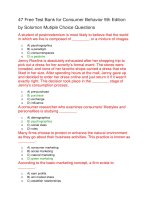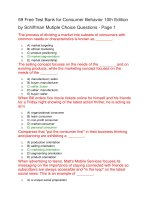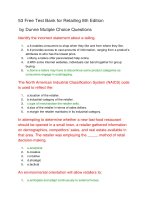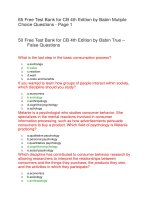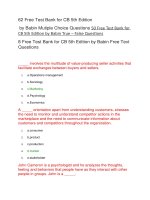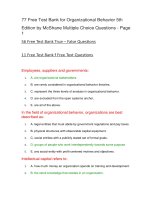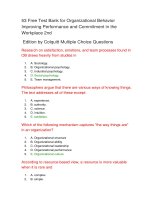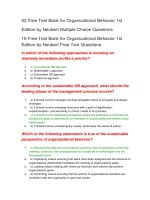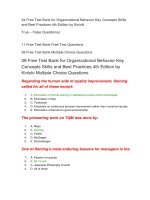53 free test bank for organizational behavior improving performance and commitment in the workplace 2nd
Bạn đang xem bản rút gọn của tài liệu. Xem và tải ngay bản đầy đủ của tài liệu tại đây (70.88 KB, 13 trang )
53 Free Test Bank for Organizational Behavior
Improving Performance and Commitment in the
Workplace 2nd
Edition by Colquitt Multiple Choice Questions
Research on satisfaction, emotions, and team processes found in
OB draws heavily from studies in
1.
2.
3.
4.
5.
A. Sociology.
B. Organizational psychology.
C. Industrial psychology.
D. Social psychology.
E. Team management.
Philosophers argue that there are various ways of knowing things.
The text addresses all of these except:
1.
2.
3.
4.
5.
A. experience.
B. authority.
C. science.
D. intuition.
E. exhibition.
Which of the following mechanism captures "the way things are"
in an organization?
1.
2.
3.
4.
5.
A. Organizational structure
B. Organizational ability
C. Organizational leadership
D. Organizational performance
E. Organizational culture
According to resource-based view, a resource is more valuable
when it is rare and
1.
2.
3.
4.
5.
A. complex.
B. simple.
C. inimitable.
D. transparent.
E. new.
Which of the following is not correct regarding big decisions?
1.
2.
3.
4.
A. Big decisions can be copied.
B. They are visible to competitors.
C. They are observable by industry experts.
D. Big decisions are inimitable.
5.
E. They are observable by experts.
In organizational behavior research, a correlation of 0.50 is
considered
1.
2.
3.
4.
5.
A. weak.
B. strong.
C. moderate.
D. irrelevant.
E. perfect.
People's behavior at work, the kinds of tasks they are interested
in, and how they react to events that happen on the job are
associated with their _____
1.
2.
3.
4.
5.
A. ability.
B. trust, justice, and ethics.
C. learning and decision making.
D. team characteristics.
E. personality and cultural values.
American Drinks International is a soft drink manufacturer in the
carbonated soda industry. The firm is commissioning a study to
explore how the company's expansion into the new product
segment of tropical fruit flavored soda would affect its profitability.
Such a study is addressed by which of these areas?
1.
2.
3.
4.
5.
A. Project management
B. Process management
C. Strategic management
D. Venture management
E. Technology management
Which of these mechanisms capture shared knowledge about the
rules, norms, and values that shape employee attitudes and
behaviors?
1.
2.
3.
4.
5.
A. Organizational structure
B. Organizational ability
C. Organizational culture
D. Job performance
E. Organizational leadership
Which of the following describes the cognitive abilities, emotional
skills, and physical abilities that employees bring to a job?
1.
2.
3.
A. Ability
B. Personality and cultural values
C. Trust, justice, and ethics
4.
5.
D. Individual's characteristics
E. Intelligence
_____ research helps inform the study of organizational culture.
1.
2.
3.
4.
5.
A. Social psychology
B. Industrial and organizational psychology
C. Anthropology
D. Sociology
E. Economics
The integrative model of organizational behavior includes a
number of individual mechanisms that directly impact job
performance and organizational commitment. Those mechanisms
include
1.
2.
3.
4.
5.
A. leader styles and behavior.
B. team diversity and communication.
C. team processes and team characteristics.
D. personality and ability.
E. stress and motivation.
According to the integrative model of organizational behavior, the
two types of group-level variables that impact individual-level
attitudes and behaviors are
1.
2.
3.
4.
5.
A. job performance and organizational commitment
B. learning and decision making
C. leadership and teams
D. personality and ability
E. stress and motivation
Which concept captures the idea that people have to make many
choices in daily work life?
1.
2.
3.
4.
5.
A. Numerous small decisions
B. Resource-based view
C. Meta-analysis
D. Rule of one-eighth
E. Socially complex resources
What Suzie feels when thinking about her job and doing her dayto-day work is captured in her
1.
2.
3.
4.
5.
A. ability.
B. job satisfaction.
C. personality.
D. decision making skills.
E. leadership style.
In organizational behavior research, a correlation of 0.10 is
considered
1.
2.
3.
4.
5.
A. weak.
B. strong.
C. moderate.
D. irrelevant.
E. perfect.
Scientific studies are based on the scientific method originated by
Sir
1.
2.
3.
4.
5.
A. Jeffery Pfeffer.
B. Frederick Taylor.
C. Charles Darwin.
D. Francis Bacon.
E. Robert Hogan.
A collection of assertions that specify how and why variables are
related, as well as the conditions in which they should (and
should not) be related refers to a
1.
2.
3.
4.
5.
A. hypothesis.
B. verification.
C. theory.
D. data.
E. collections.
Employees' psychological responses to job demands that tax or
exceed their capacities come under which of the following
mechanisms?
1.
2.
3.
4.
5.
A. Job satisfaction
B. Ability
C. Job performance
D. Leadership style
E. Stress
_______ are written predictions that specify relations between
variables.
1.
2.
3.
4.
5.
A. Hypotheses
B. Verifications
C. Theories
D. Data
E. Collections
Which of these mechanisms dictate how the units within the firm
link to other units?
1.
2.
3.
4.
5.
A. Organizational culture
B. Organizational ability
C. Organization size
D. Organizational structure
E. Organizational leadership
An OB study might explore the relationship between pay and
motivation, whereas a _______ study might examine the best
way to structure compensation programs.
1.
2.
3.
4.
5.
A. Strategic management
B. Anthropology
C. Organizational development
D. Economics
E. Human resource management
_______ summarize the statistical relationships between
variables.
1.
2.
3.
4.
5.
A. Datasets
B. Correlations
C. Observations
D. Collections
E. Consolidations
Correlation can be positive or negative and can range from
1.
2.
3.
4.
5.
A. -1 to + 1
B. -.5 to + .5
C. -1 to + 10
D. .1 to 1
E. -3 to + 3
_____ is vital to research on team characteristics and
organizational structure.
1.
2.
3.
4.
5.
A. Social psychology
B. Industrial and organizational psychology
C. Anthropology
D. Economics
E. Sociology
Which course focuses on the product choices and industry
characteristics that affect the organization's profitability?
1.
2.
3.
4.
A. Marketing management
B. Process management
C. Operations management
D. Strategic management
5.
E. Research and development
The process by which individuals attain authority over others is
summarized by
1.
2.
3.
4.
5.
A. leader cultural values.
B. leader personality.
C. leader styles and behaviors.
D. leader responsibilities.
E. leader power and influence.
When a firm expands into a new product segment, it is known as
1.
2.
3.
4.
5.
A. market development.
B. diversification.
C. market penetration.
D. concept development.
E. product proliferation.
According to the integrative model of organizational behavior,
which of the following is an individual outcome?
1.
2.
3.
4.
5.
A. Job satisfaction
B. Ability
C. Personality
D. Organizational commitment
E. Motivation
OB can be contrasted with two other courses commonly offered in
management departments:_____ and strategic management.
1.
2.
3.
4.
5.
A. project management
B. business management
C. human resource management
D. operations management
E. financial management
The way teams are formed, staffed, and composed, and the way
members depend on one another is summarized by
1.
2.
3.
4.
5.
A. team processes.
B. team innovation.
C. team characteristics.
D. team policies.
E. team interaction.
Causal inferences cannot be established in case
1.
2.
3.
A. the two variables are correlated.
B. the presumed cause precedes the presumed effect in time.
C. no alternative explanation exists for the correlation.
4.
5.
D. the presumed effect precedes the presumed cause in time.
E. of experiments, where researchers have more control over the setting in
which the study occurs.
Which of the following influences the kinds of tasks an employee
is good at and those with which an employee may struggle?
1.
2.
3.
4.
5.
A. Personality
B. Ability
C. Trust, justice, and ethics
D. Learning and decision making
E. Cultural values
As employees gain experience, they obtain job knowledge and
use this knowledge to make accurate judgments on the job.
Which of the following is represented by this statement?
1.
2.
3.
4.
5.
A. Team processes
B. Trust, justice, and ethics
C. Learning and decision making
D. Personality and ability
E. Motivation
Scientists can build theories explaining why social recognition
might influence the performance and commitment of work units.
Which of these cannot be a source of information for building this
theory?
1.
2.
3.
4.
5.
A. Interviews with employees
B. Research and development
C. Research reviews
D. Company documents
E. Observation of people at work
According to the Rule of One-Eighth,
1.
2.
3.
4.
5.
A. at least 88 percent of organizations will do everything necessary to put
people first and thereby build profits.
B. at best 12 percent of organizations will actually do what is required to
build profits by putting people first.
C. 75 percent of organizations won't believe the connection between how
they manage their people and the profits they earn.
D. 38 percent of the organizations try to make a single change to solve their
problems.
E. one in eight organizations miserably fail at making the people to profit
connection.
Which of these takes all the correlations found in studies of a
particular relationship and calculates a weighted average of
them?
1.
2.
3.
4.
5.
A. Alpha analysis
B. Gamma analysis
C. Meta-analysis
D. Omega analysis
E. Beta analysis
Models from _______ are used to understand motivation,
learning, and decision making in OB.
1.
2.
3.
4.
5.
A. Marketing
B. Economics
C. Sociology
D. Strategic management
E. Anthropology
Which of the following statements about the resource-based view
of organizations is false?
1.
2.
A. It describes what exactly makes resources valuable.
B. It describes what makes resources capable of creating long-term profits
for the firm.
3. C. A firm's resources include financial and physical resources.
4. D. A firm's resources include resources related to organizational behavior.
5. E. It suggests that the value of resources depends on a single factor.
Mindy is a new employee at a company. She feels very energetic
and this drives her to perform well. Which of these individual
mechanisms captures the energetic forces that drive employees'
work efforts?
1.
2.
3.
4.
5.
A. Motivation
B. Ability
C. Job performance
D. Personality
E. Stress
Which of the following reflects the degree to which employees
feel that their company does business with fairness, honesty, and
integrity?
1.
2.
3.
4.
A. Job satisfaction
B. Trust, justice, and ethics
C. Team processes
D. Personality and ability
5.
E. Motivation
_______ reflect the various traits and tendencies that describe
how people act, with commonly studied traits including
extraversion, conscientiousness, and collectivism.
1.
2.
3.
4.
5.
A. Leadership
B. Motivation
C. Social values
D. Personality and cultural values
E. Learning
According to the integrative model of organizational behavior, two
of the individual characteristics that impact individual attitudes
and behaviors include
1.
2.
3.
4.
5.
A. job performance and organizational commitment.
B. organizational culture and organizational structure.
C. team processes and team characteristics.
D. personality and ability.
E. stress and motivation.
The basketball team at a local school has attributed their poor
performance to the following: the team's coordination; inability to
resolve conflict and cohesion. Which of the following is
represented by the above scenario?
1.
2.
3.
4.
5.
A. Team responsibilities
B. Team innovation
C. Team characteristics
D. Team processes
E. Team problem solving
According to the integrative model of organizational behavior, the
two organizational-level variables that impact individual-level
attitudes and behaviors are
1.
2.
3.
4.
5.
A. job performance and organizational commitment
B. culture and structure
C. team processes and team characteristics
D. personality and ability
E. stress and motivation
All of these are individual mechanisms as reflected in the
integrative model of organizational behavior except:
1.
2.
3.
A. stress.
B. motivation.
C. job satisfaction.
4.
5.
D. learning.
E. job performance.
The primary outcomes of interest to organizational behavior
researchers are
1.
2.
3.
4.
5.
A. job performance and organizational commitment.
B. organizational culture and organizational structure.
C. team processes and team characteristics.
D. personality and ability.
E. stress and motivation.
In organizational behavior research, a correlation of + 1 is
considered
1.
2.
3.
4.
5.
A. weak.
B. unimpressive.
C. moderate.
D. irrelevant.
E. perfect.
OB research on job performance and individual characteristics
draws primarily from studies in
1.
2.
3.
4.
5.
A. Industrial and organizational psychology.
B. Social psychology.
C. Sociology.
D. Sales management.
E. Marketing management.
Which of these abbreviations represent a correlation?
1.
2.
3.
4.
5.
A. r c
B. r r
C. r
D. cr
E. rc.
In organizational behavior research, a correlation of 0.30 is
considered
1.
2.
3.
4.
5.
A. weak.
B. strong.
C. moderate.
D. irrelevant.
E. perfect.
According to the integrative model of organizational behavior,
trust, justice, and ethics are
1.
A. individual mechanisms.
2.
3.
4.
5.
B. organizational mechanisms.
C. group mechanisms.
D. individual outcomes.
E. group outcomes.
Which of the following captures the specific actions that leaders
take to influence others at work?
1.
2.
3.
4.
5.
A. Leader styles and behaviors
B. Leader cultural values
C. Leader personality
D. Leader influence
E. Leader power
